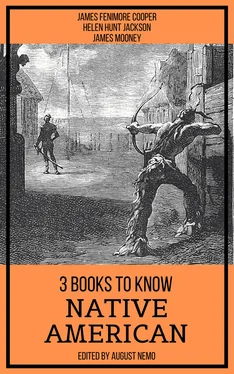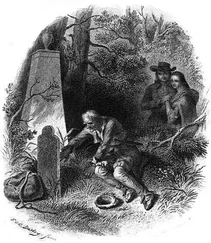“’Tis the merit of the animal! They come from the shores of Narragansett Bay, in the small province of Providence Plantations, and are celebrated for their hardihood, and the ease of this peculiar movement; though other horses are not unfrequently trained to the same.”
“It may be — it may be,” said Hawkeye, who had listened with singular attention to this explanation; “though I am a man who has the full blood of the whites, my judgment in deer and beaver is greater than in beasts of burden. Major Effingham has many noble chargers, but I have never seen one travel after such a sideling gait.”
“True; for he would value the animals for very different properties. Still is this a breed highly esteemed, and as you witness, much honored with the burdens it is often destined to bear.”
The Mohicans had suspended their operations about the glimmering fire, to listen; and when Duncan had done, they looked at each other significantly, the father uttering the never-failing exclamation of surprise. The scout ruminated, like a man digesting his newly acquired knowledge, and once more stole a curious glance at the horses.
“I dare to say there are even stranger sights to be seen in the settlements!” he said, at length; “natur’ is sadly abused by man, when he once gets the mastery. But, go sideling or go straight, Uncas had seen the movement, and their trail led us on to the broken bush. The outer branch, near the prints of one of the horses, was bent upward, as a lady breaks a flower from its stem, but all the rest were ragged and broken down, as if the strong hand of a man had been tearing them! So I concluded that the cunning varmints had seen the twig bent, and had torn the rest, to make us believe a buck had been feeling the boughs with his antlers.”
“I do believe your sagacity did not deceive you; for some such thing occurred!”
“That was easy to see,” added the scout, in no degree conscious of having exhibited any extraordinary sagacity; “and a very different matter it was from a waddling horse! It then struck me the Mingos would push for this spring, for the knaves well know the vartue of its waters!”
“Is it, then, so famous?” demanded Heyward, examining, with a more curious eye, the secluded dell, with its bubbling fountain, surrounded, as it was, by earth of a deep dingy brown.
“Few redskins, who travel south and east of the great lakes, but have heard of its qualities. Will you taste for yourself?”
Heyward took the gourd, and after swallowing a little of the water, threw it aside with grimaces of discontent. The scout laughed in his silent, but heartfelt manner, and shook his head with vast satisfaction.
“Ah! you want the flavor that one gets by habit; the time was when I liked it as little as yourself; but I have come to my taste, and I now crave it, as a deer does the licks. 17 Your high spiced wines are not better liked than a redskin relishes this water; especially when his natur’ is ailing. But Uncas has made his fire, and it is time we think of eating, for our journey is long, and all before us.”
17 Many of the animals of the American forests resort to those spots where salt springs are found. These are called “licks” or “salt licks,” in the language of the country, from the circumstance that the quadruped is often obliged to lick the earth, in order to obtain the saline particles. These licks are great places of resort with the hunters, who waylay their game near the paths that lead to them.
Interrupting the dialogue by this abrupt transition, the scout had instant recourse to the fragments of food which had escaped the voracity of the Hurons. A very summary process completed the simple cookery, when he and the Mohicans commenced their humble meal, with the silence and characteristic diligence of men who ate in order to enable themselves to endure great and unremitting toil.
When this necessary, and, happily, grateful duty had been performed, each of the foresters stooped and took a long and parting draught at that solitary and silent spring, 18 around which and its sister fountains, within fifty years, the wealth, beauty, and talents of a hemisphere were to assemble in throngs, in pursuit of health and pleasure. Then Hawkeye announced his determination to proceed. The sisters resumed their saddles; Duncan and David grasped their rifles, and followed on their footsteps; the scout leading the advance, and the Mohicans bringing up the rear. The whole party moved swiftly through the narrow path, towards the north, leaving the healing waters to mingle unheeded with the adjacent brook, and the bodies of the dead to fester on the neighboring mount, without the rites of sepulture; a fate but too common to the warriors of the woods to excite either commiseration or comment.
18 The scene of the foregoing incidents is on the spot where the village of Ballston now stands; one of the two principal watering-places of America.
––––––––
“I’ll seek a readier path.”
Parnell.
––––––––

The route taken by Hawkeye lay across those sandy plains, relieved by occasional valleys and swells of land, which had been traversed by their party on the morning of the same day, with the baffled Magua for their guide. The sun had now fallen low towards the distant mountains; and as their journey lay through the interminable forest, the heat was no longer oppressive. Their progress, in consequence, was proportionate; and long before the twilight gathered about them, they had made good many toilsome miles on their return.
The hunter, like the savage whose place he filled, seemed to select among the blind signs of their wild route, with a species of instinct, seldom abating his speed, and never pausing to deliberate. A rapid and oblique glance at the moss on the trees, with an occasional upward gaze towards the setting sun, or a steady but passing look at the direction of the numerous water-courses, through which he waded, were sufficient to determine his path, and remove his greatest difficulties. In the meantime, the forest began to change its hues, losing that lively green which had embellished its arches, in the graver light which is the usual precursor of the close of day.
While the eyes of the sisters were endeavoring to catch glimpses through the trees, of the flood of golden glory which formed a glittering halo around the sun, tinging here and there with ruby streaks, or bordering with narrow edgings of shining yellow, a mass of clouds that lay piled at no great distance above the western hills, Hawkeye turned suddenly, and, pointing upwards towards the gorgeous heavens, he spoke:—
“Yonder is the signal given to a man to seek his food and natural rest,” he said: “better and wiser would it be, if he could understand the signs of nature, and take a lesson from the fowls of the air and the beasts of the fields! Our night, however, will soon be over; for, with the moon, we must be up and moving again. I remember to have fou’t the Maquas, hereaways, in the first war in which I ever drew blood from man; and we threw up a work of blocks, to keep the ravenous varmints from handling our scalps. If my marks do not fail me, we shall find the place a few rods farther to our left.”
Without waiting for an assent, or, indeed, for any reply, the sturdy hunter moved boldly into a dense thicket of young chestnuts, shoving aside the branches of the exuberant shoots which nearly covered the ground, like a man who expected, at each step, to discover some object he had formerly known. The recollection of the scout did not deceive him. After penetrating through the brush, matted as it was with briers, for a few hundred feet he entered an open space, that surrounded a low, green hillock, which was crowned by the decayed block-house in question. This rude and neglected building was one of those deserted works, which, having been thrown up on an emergency, had been abandoned with the disappearance of danger, and was now quietly crumbling in the solitude of the forest, neglected, and nearly forgotten, like the circumstances which had caused it to be reared. Such memorials of the passage and struggles of man are yet frequent throughout the broad barrier of wilderness which once separated the hostile provinces, and form a species of ruins that are intimately associated with the recollections of colonial history, and which are in appropriate keeping with the gloomy character of the surrounding scenery. 19 The roof of bark had long since fallen, and mingled with the soil; but the huge logs of pine, which had been hastily thrown together, still preserved their relative positions, though one angle of the work had given way under the pressure, and threatened a speedy downfall to the remainder of the rustic edifice. While Heyward and his companions hesitated to approach a building so decayed, Hawkeye and the Indians entered within the low walls, not only without fear, but with obvious interest. While the former surveyed the ruins, both internally and externally, with the curiosity of one whose recollections were reviving at each moment, Chingachgook related to his son, in the language of the Delawares, and with the pride of a conqueror, the brief history of the skirmish which had been fought, in his youth, in that secluded spot. A strain of melancholy, however, blended with his triumph, rendering his voice, as usual, soft and musical.
Читать дальше













